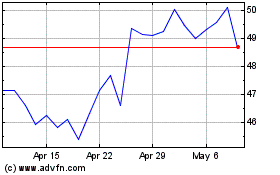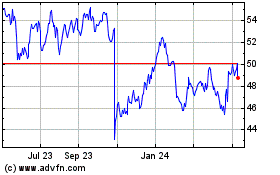By Peter Loftus
Drugmaker Sanofi SA has ended its development of two Zika virus
vaccines, citing a decline in new infections and limits on U.S.
government funding, in a move that illustrates the challenges in
sustaining research in emerging infectious diseases after major
outbreaks subside.
A division of the U.S. Department of Health and Human Services,
the Biomedical Advanced Research and Development Authority, or
BARDA, informed the French company's Sanofi Pasteur vaccine unit in
August that the agency had reviewed the Zika projects it was
funding and "decided to focus on a more limited set of goals and
deliverables," Sanofi said in a statement posted on its website
Sept. 1.
As a result, the company said it is discontinuing its
development of the Zika vaccine it had been testing in partnership
with the U.S. Army since last year. The Walter Reed Army Institute
of Research originally developed that vaccine, which contains an
inactivated virus, and Sanofi had been helping to study whether it
was safe and effective in people, with a $43 million BARDA
grant.
Jon Heinrichs, associate vice president and Zika project leader
at Sanofi, said in an interview that Sanofi's development of the
Army vaccine was going to take several years longer than expected
because of the need to evaluate new vaccine doses manufactured by
the company, and because of the decline in infection rates. He said
BARDA was unable to commit to additional funding to accommodate the
longer timeline.
"The driving forces behind this are change in epidemiology and
lack of additional funding," Mr. Heinrichs said.
Sanofi had been part of a big push by drug companies and
government and private researchers to find new vaccines and
medicines after the mosquito-borne virus spread rapidly in Brazil
and elsewhere in the Americas in 2015 and 2016. The virus was
linked to causing defects in many babies and fetuses of women
infected by the virus.
But the rate of new infections has declined, and in November
2016 the WHO lifted the public-health emergency for the outbreak it
had declared earlier last year.
The decline in infection rates may prolong vaccine development
time lines because researchers may have to enroll more people in
clinical trials to get enough data to demonstrate safety and
efficacy, said Anthony S. Fauci, director of the National Institute
of Allergy and Infectious Disease, in an interview.
Development of vaccines for such unpredictable pathogens is "a
risky business," Dr. Fauci said. "It's unlike the development of
drugs and therapeutics for predictable diseases. It's tenuous."
A similar scenario unfolded with the Ebola virus epidemic that
killed thousands in West Africa in 2014. Companies, governments and
nonprofits raced to find drugs and vaccines, but by the time they
were ready to test them in the field, the epidemic had waned and it
became harder to assess their safety and efficacy. Three years
later, no Ebola drug or vaccine has been approved by health
regulators. Merck & Co. continues to develop an Ebola vaccine
and has contributed doses to a U.S. government stockpile, and plans
to file for U.S. regulatory approval by the end of this year.
"Zika remains a public health threat and we remain committed to
working with industry on Zika diagnostics and vaccines," BARDA
Director Rick Bright said in a statement Wednesday. He said the
agency continually evaluates the projects it's funding, which led
to revising the contract with Sanofi. He added that BARDA continues
to fund the development of several Zika diagnostics and
blood-screening tests, and three other vaccines, including those
developed by Takeda Pharmaceutical Co., Moderna Therapeutics and
Brazil's Butantan Institute.
Several other companies and government agencies also continue to
develop Zika vaccines, including Inovio Pharmaceuticals Inc.
This is the second Zika vaccine Sanofi has shelved, Mr.
Heinrichs said Wednesday. Late last year the company suspended
development of a live-virus vaccine because it would have taken
many years to develop it, and the company wanted to focus on the
Walter Reed-developed vaccine, he said. Sanofi hadn't previously
disclosed shelving that vaccine.
There is no approved vaccine for Zika, a virus first identified
seven decades ago. Zika has infected more than 220,000 people in
the Americas since 2015, with hundreds of thousands more suspected
cases; most of them occurred before this year. Most cases have been
in Latin America, but some were reported in the U.S., including
more than 200 transmitted via mosquito bites in the U.S. and nearly
50 via sexual contact.
The NIAID is testing its own experimental Zika vaccine in a
study in Puerto Rico, Texas and several South American countries.
If infection rates remain low, researchers may have to enroll up to
5,000 study volunteers, but if infections increase the study could
have as few as 2,600 participants, Dr. Fauci said. He said the
study may complete enrollment by mid-2018.
Dr. Fauci of the NIAID said Zika's pattern is unpredictable, and
it could go under the radar for a few years before coming back.
Sanofi said Friday that BARDA planned to modify its contract
with the company so development would be "indefinitely paused" but
could be restarted if another epidemic emerges.
Sanofi's collaboration with the U.S. Army drew criticism after
the Army said last year it planned to grant exclusive patent
licenses to Sanofi for the Zika vaccine. Knowledge Ecology
International, a nonprofit, objected to the plan because it didn't
include a cap on the price Sanofi could charge for a vaccine if it
reached the market. In response to the proposed patent deal, Sen.
Bernie Sanders, a Vermont independent, proposed a law that would
require federal agencies to secure fair-pricing agreements in
exchange for license and rights deals.
Mr. Heinrichs of Sanofi said "we were quite frankly disheartened
by the fact we entered into this with the best of intentions to
help out in the face of an epidemic. We really felt the brunt of a
lot of negative publicity and political pressures" over the patent
issue. He said Sanofi's position was that it was too early to
discuss pricing.
Write to Peter Loftus at peter.loftus@wsj.com
(END) Dow Jones Newswires
September 06, 2017 17:56 ET (21:56 GMT)
Copyright (c) 2017 Dow Jones & Company, Inc.
Sanofi (NASDAQ:SNY)
Historical Stock Chart
From Mar 2024 to Apr 2024

Sanofi (NASDAQ:SNY)
Historical Stock Chart
From Apr 2023 to Apr 2024
